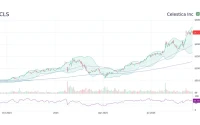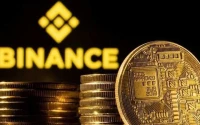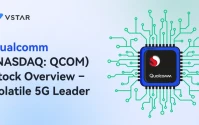The Quantum Gold Rush: Is IonQ Building the Future or Just the Hype?
Let's not kid ourselves. We're watching a full-blown mania unfold in the quantum computing space, and IonQ is the star of the show. The stock is up something like 700% in a year, minting a market cap north of $20 billion. For what? For a company that pulled in about $21 million in revenue last quarter. You don't need a quantum computer to do that math. It's insane.
This isn't investing; it's a high-stakes poker game where the pot is filled with venture capital and retail FOMO, and nobody has even seen the flop yet. Everyone's betting on the idea of a royal flush—the promise that quantum computing will one day change everything from medicine to finance. IonQ is holding a pair of sevens and telling everyone they've got pocket aces. And right now, the market is buying it.
Are we just supposed to ignore a price-to-sales ratio of over 300? Tech stocks are supposed to be expensive, sure, but that's a number from another dimension. It’s a valuation built on pure, uncut hopium, mainlined directly into the veins of Wall Street. And what happens when that high wears off?
A Bonfire of Billion-Dollar Bills
I'll give IonQ this: they know how to spend money. Research and development costs spiked 230% in a single quarter. They’re snapping up smaller companies like Oxford Ionics for a cool billion dollars and talking about roadmaps that promise 80,000 logical qubits by 2030. It all sounds incredibly impressive, doesn't it? “Aggressive technology roadmap,” the analysts chirp, raising their price targets to the moon.
But let's translate that from PR-speak. An "aggressive roadmap" is just a fancy term for a list of promises that are incredibly difficult to keep. They’re burning through cash at a staggering rate, with losses widening to $177.5 million in a quarter. This is all just hype. No, 'hype' doesn't even cover it—this is a financial religion being built in real-time, and its first commandment is "Thou Shalt Not Look at the Balance Sheet."

They’re talking about a "Quantum Internet" and partnering with NVIDIA to speed up drug discovery. They even invested in a Swedish autonomous trucking company, Einride, which sent the stock soaring 10% in a day. It's a brilliant strategy, offcourse. Slap the word "quantum" on a self-driving truck and watch the money printer go brrrr. But does anyone actually stop and ask what tangible value a quantum algorithm is providing to a logistics company today? Or is it just another press release to keep the stock levitating?
We've Seen This Movie Before
The craziest part is that IonQ isn't alone. Its "competitors," Rigetti and D-Wave, have seen their own penny stocks explode into multi-billion-dollar valuations on even thinner revenues. IonQ and Rigetti stocks and the quantum computing bubble. The whole sector is a bubble inside a bubble, floating on the hot air of McKinsey reports that predict a $72 billion market a decade from now. It feels an awful lot like the late 90s, when you could add ".com" to a pet food company and watch your valuation triple.
The bull case, I guess, is that one of these companies will actually crack the code and become the Intel or Microsoft of a new computing paradigm. IonQ has a huge cash pile after raising another billion dollars, so they have the runway to keep trying. They’ve made some legitimate technical breakthroughs, like converting qubit emissions to telecom-band photons. That’s genuinely cool science.
But for every Amazon that emerged from the dot-com ashes, there were a hundred Pets.coms that went to zero. And right now, the market is treating every single one of these quantum companies like they're the next Amazon. They can’t all be winners. When the music stops, there won't be enough chairs for everyone. Then again, I probably would have said the same thing about Tesla ten years ago. Maybe I'm just the old guy yelling at a cloud.
Look, It's a Lottery Ticket
Let’s be brutally honest. Buying IonQ stock right now isn't an investment in a business. It's a bet. It’s a pure, speculative gamble on a technological future that is still years, maybe decades, away from being realized. The science is fascinating, world-changing even. But the stock is a casino chip being tossed around a table where nobody knows the rules of the game yet. Someone will get fantastically rich from this, but a hell of a lot more people are going to get burned. Just make sure you're not the one left holding the bag when everyone else decides to cash out.









